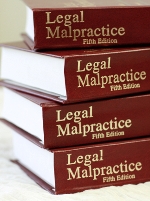 Attorney Karen Rubin of Thompson Hines wrote a post about Edward T. Joyce & Assocs., P.C. v. Professionals Direct Insurance Co. (PACER identification required for access), a case in the Northern District of Illinois, in which the court held that the Joyce firm’s legal malpractice insurer didn’t have to indemnify it for attorneys’ fees that the firm was ordered repay due to its misconduct, because the policy excluded coverage for sanctions.
Attorney Karen Rubin of Thompson Hines wrote a post about Edward T. Joyce & Assocs., P.C. v. Professionals Direct Insurance Co. (PACER identification required for access), a case in the Northern District of Illinois, in which the court held that the Joyce firm’s legal malpractice insurer didn’t have to indemnify it for attorneys’ fees that the firm was ordered repay due to its misconduct, because the policy excluded coverage for sanctions.
Fee Dispute and Arbitration
According to attorney Thompson, “the Joyce Firm represented more than 100 individuals and entities as plaintiffs under a contingent fee agreement. After obtaining an arbitration award against the insolvent defendant, the Joyce Firm hired additional co-counsel to help…pursue a claim against the defendant’s insurer”, which resulted in an $8.6 million settlement.
“Plaintiffs, however, disputed the amount and basis of the Joyce Firm’s fees arising from that settlement, and also disputed who was responsible for paying the additional co-counsel’s fees. Plaintiffs demanded arbitration, seeking, among other things, “equitable disgorgement.” The arbitrator found several instances of misconduct on the part of the Joyce Firm…(and) determined that “as a sanction,” it had to pay 25 percent of the co-counsel’s fees, or about $150,000.”
The firm “was also ordered as ‘a sanction’” to repay the plaintiffs more than $405,000 in fees that it had previously collected as “contingent hourly fees” under an attempt that it made to modify the original fee agreement “by adding a provision for an hourly contingent fee.”
The law firm appealed, but “the trial court confirmed the arbitration award, the court of appeals affirmed, and the state supreme court denied a petition for leave to appeal.”
Malpractice Insurer Denies Coverage
The Joyce Firm’s legal malpractice insurer refused to indemnify it, i.e., to pay the sanctions that the arbitrator awarded to plaintiffs, due to an exclusion in its policy for “any claim for fines, sanctions, penalties, punitive damages or any damages resulting from the multiplication of compensatory damages”. Note: the words in bold type are defined in the policy; damages means “monetary judgments, awards or settlements unless otherwise excluded.”
Declaratory Judgment
The Joyce Firm responded by filing a declaratory judgment action against its insurer, arguing that despite the arbitrator’s use of the term “sanction”, he meant disgorgement, as he found that the firm did not intend to violate the law or the rules of ethics. (Recall that the plaintiffs in the underlying case demanded “equitable disgorgement” from the firm.)
The district court rejected that argument, citing the arbitrator’s “stated imposition of sanctions,” and the state court of appeals’ affirmation of the arbitration award, which “expressly and repeatedly referred to the damages award as a sanction.” It granted summary judgment in favor of the insurer.
LESSONS
Law Firm Risk Management
Attorney Thomson points out that “Model Rule 1.5(b) requires that once agreed to, any change in the basis or rate of the fee must be communicated to the client. That was apparently not carried out adequately in this case, providing one of the implicit bases for the arbitrator’s award against the firm.”
Clearly, any firm that attempts to modify a fee agreement during an engagement, doesn’t get the client’s approval – as apparently happened to the Joyce firm – but bills the client as if it had approved the modification, is inviting a fee dispute that it’s unlikely to win.
Usually, the client refuses to pay the fees, the firm sues to collect – if pre-suit collection attempts are unsuccessful, and the amount is large enough – and the client then files a counterclaim for malpractice. This case differs in two respects: the client paid the Joyce firm’s modified fees, i.e., the contingent hourly fees, probably because it didn’t want to jeopardize the underlying case, which was a wise decision, considering it obtained an $8.6M judgment, and the fee dispute was arbitrated, likely due to an arbitration clause in the engagement letter between the Joyce firm and its client.
However, the outcome was as expected: the client contested the unapproved fees, and prevailed.
Legal Malpractice Insurance
Ironically, even if the court had accepted the Joyce firm’s argument that the arbitrator meant “disgorgement”, rather than “sanctions”, there still wouldn’t have been any coverage, because its legal malpractice policy also excludes coverage for “any claim for legal fees, costs, or disbursements paid or owed to you.” The arbitrator ordered the firm to repay $405,000 “in fees it had previously collected” from its client, which is clearly a “claim for legal fees…paid or owed to you”.
The bottom line is that any demand for reimbursement/disgorgement of fees, even if it’s couched as “sanctions”, as in this case, won’t be covered by a legal malpractice policy, either because of an exclusion like that contained in the Joyce firm’s policy, or because of the definition of “Damages”, as in the Markel Insurance Company’s policy: “Damages means compensatory judgments, settlements or awards, but does not include punitive or exemplary damages, fines or penalties, sanctions, the return of fees or other consideration paid to the Insured…”



